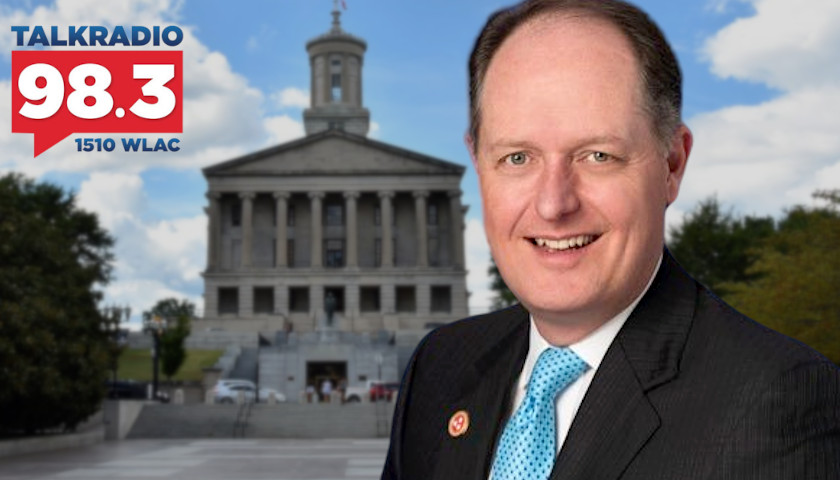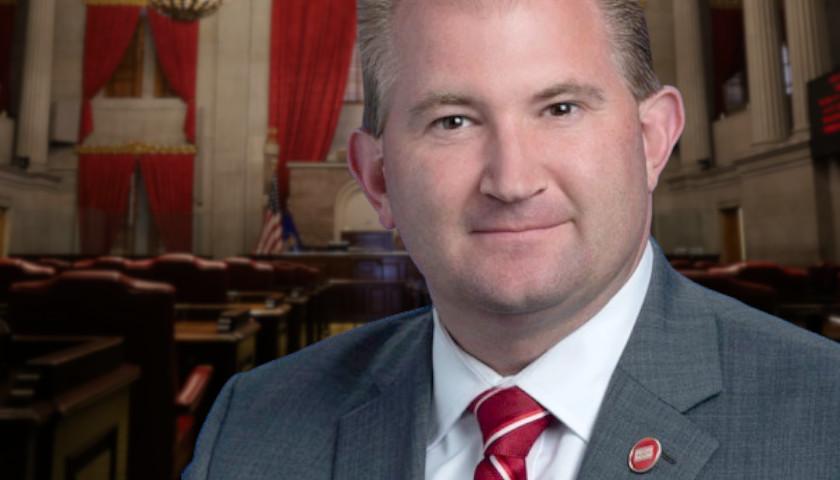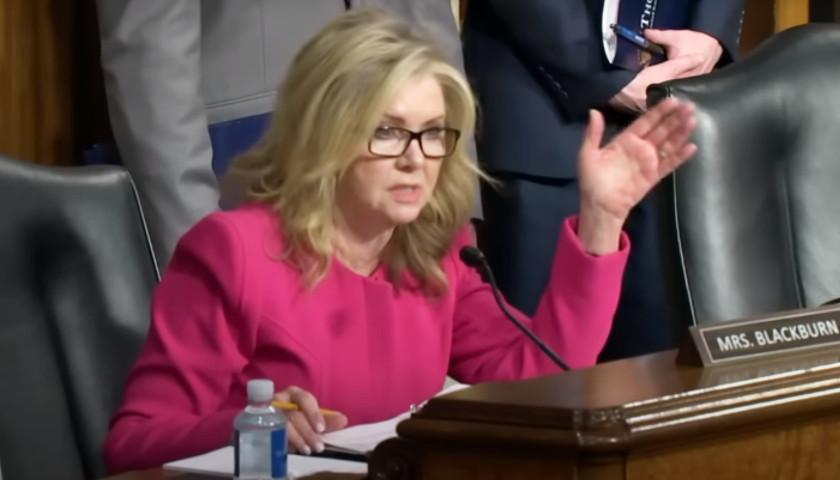Live from Music Row Monday morning on The Tennessee Star Report with Michael Patrick Leahy – broadcast on Nashville’s Talk Radio 98.3 and 1510 WLAC weekdays from 5:00 a.m. to 8:00 a.m. – host Leahy and guest host Ben Cunningham welcomed Tennessee State Senator Jack Johnson to the newsmakers line.
During the second hour, Johnson discussed the Medicaid block grant and what the Tennessee General Assembly and Governor Lee would do should the Biden administration try to reverse the legislation. He later weighed in on the recent executive order to up the refugee resettlement and expressed his concern for the threshold, ceiling, and vetting of the number of people that would enter the United States.. Johnson stated that a reintroduction of the previous refugee resolution lawsuit could be in the future.
Leahy: On the newsmaker line our good friend State Senate Majority Leader Jack Johnson. Good morning, Jack.
Johnson: Good morning, Michael good to be with you.
Leahy: Well, we’re glad to have the on Senator Johnson. So this Tennessee General Assembly is back in session. What are the big agenda items?
Johnson: Well, Michael as you know, and I know you’ve talked about it some we’ve actually been in session. It’s the strangest start of a General Assembly that I’ve ever been a part of because we convened on the second Tuesday in January as we’re constitutionally compelled to do. And typically we come in for about three days to do some procedural stuff and then we take a two-week break so that new members can move into their offices and hire staff and you have a new committee chairman and things like that.
But we didn’t do that. We segued right into a regular session so that we could take up a resolution dealing with Medicaid block grant legislation that was approved by the Trump administration that is incredibly significant. And I’m happy to talk about that in greater detail if you’d like. And then once that was done we transitioned into a special legislative session to deal with some educational issues relative to learning loss and kids being out of school.
And I’ve been listening to you this morning, a wonderful conversation about what’s going on. And then our efforts to try to mitigate that damage with our kids. So we’ve already done all that. We did take a break for that reorganizational purpose. And today we reconvene for the remainder of our regular session today this afternoon.
Leahy: Now, you mentioned the Medicaid block grant granted by the Trump administration. Do you anticipate the Biden administration will attempt to stop that? and if so, what will the Tennessee General Assembly and Governor Lee do?
Jackson: Well we hope not. We hope not. And we certainly would think that they have bigger fish to fry than this particular issue. And this is something that was negotiated between Governor Lee, the administration, our folks at TennCare, and the centers for Medicaid and Medicare Services (CMS) over about an 18-month period of time.
And this got very deep into the weeds Michael with the bureaucrats in Washington with folks that are there regardless of who is president. and so we were able to reach that agreement with them now. I will tell you I believe that Congressman Cooper and Congressman Cohen have already written a letter to President Biden asking that they do rescind that agreement.
Leahy: I’m shocked! I’m shocked! (Laughter)
Johnson: As am I. As am I. but then on the other hand are other seven Congressman Republican congressman and women in our two United States Senators are obviously making the complete opposite case. and they should not rescind it. This is good. It’s bold and its innovative. We have one of the best run Medicaid programs in the entire nation. And it’s only fair that we be granted greater latitude to take care of our folks in Tennessee and get to keep some of the savings that we generate because of our efficiencies.
Cunningham: Jack. Hey, this is Ben Cunningham.
Johnson: Hey Ben!
Cunningham: Is it clear that Biden has the authority to rescind it? I mean is that within his power?
Johnson: Well, I would argue no. I would argue that they don’t have the authority to do that at Ben. This is a contractual agreement and certainly, there are all kinds of contractual agreements that permeate or supersede a change in administration. But you and I both know that that being illegal or wrong doesn’t necessarily stop the Biden administration when you look at what they’ve done through executive orders. Should they take a notion to rescind that agreement it wouldn’t surprise me if they try to do so. If they do and I can’t argue the legal aspects of it, but I would certainly hope that there would be a possible remedy there for us in the courts to compel them to to adhere to that agreement that was negotiated.
Leahy: Speaking of illegal executive orders issued by President Biden, one of his first executive orders said in my view is illegal, that he decided to change the law with regards to the refugee resettlement ceiling. As you know in the Refugee Act of 1980 the president sets that ceiling for a fiscal year in September.
And the full fiscal year begins in October and ends in September. the president for this fiscal year, President Trump set that number at 12,000. And then just a couple of weeks ago via executive order, Joe Biden said no, it’s going to be 125,000. And we are going to start bringing in 10 times as many refugees this fiscal year as was authorized by law. That raises quite an interesting question to me Senator Johnson.
Johnson: It does.
Leahy: Jump in and tell me what your response to that is.
Johnson: Well, I’m deeply concerned about it. And you recall that we had a conversation and Tennessee a couple of years of 18 months ago or however long it was about refugee resettlement. And people had some strong feelings about it on all sides and there were some very valid point points made. But one of the things that gave me a degree of comfort regarding refugee resettlement was the efforts by the Trump administration that were confirmed regarding their efforts to vet the people that were coming into the United States.
So I’m equally concerned Michael about the threshold, the ceiling, and the sheer number of people coming into the United States as I am about how those people are being vetted in terms of their criminal backgrounds and so forth. It is gravely concerning. And you characterized it as being illegal in terms of an executive order. And I would agree that that is clearly something that should go through the legislative branch.
Leahy: Do you think that the Tennessee General Assembly will resurrect its lawsuit resolution to sue the federal government on 10th Amendment grounds for placing refugees in Tennessee and forcing Tennessee taxpayers to cover all their social benefits? That was a resolution that ended up in a lawsuit and wasn’t backed by either Governor Haslam or Governor Lee. It was thrown out by the courts for lack of standing because the governor wasn’t behind it. Do you see any movement in the Tennessee General Assembly to reintroduce such legislation and bring it to Governor Lee for his signature this session?
Johnson: Yes, I do believe we’ll have that conversation. I can’t tell you what the ultimate outcome of that would be. But my predecessor as majority leader was a leader in that. Senator Mark Norris now federal judge Mark Norris in terms of that lawsuit. And so yes, I do think that we would revisit that. It’s terribly concerning Michael and Ben about the Biden administration doing these executive orders.
This is one example where they are clearly subverting the legislative process. And I hope that not only on the refugee issue but on a myriad of other executive orders that have been issued by the Biden administration that those will be visited by the courts.
Leahy: Ben, did you want to jump in with a question?
Cunningham: I was just going to say I know you guys are going to be dealing with a lot of money this year. There’s a report that where there’s maybe three billion extra money that you’ll make decisions about. I sure hope that the rainy day fund will be given due consideration so we can understand that when we do have a downturn and the tax revenues are affected. You guys have done a magnificent job managing our money. And another report came out I think last month showing Tennessee one of the if not the lowest taxed states.
Leahy: Number one.
Cunningham: Number 50. So you guys have done a really great job taking care of the taxpayers’ money. But I just wanted to say I know you’re going to have a lot of money to deal with this year. Certainly hope that you’ll consider the rainy day fund and putting some more money in there.
Johnson: Absolutely Ben. Great point. and you’re right. I’m proud to say that Tennessee is not only the least taxed state in the nation. We are the least indebted state in the nation. We have one of the strongest pension plans which as you know is where states really get in some serious trouble not to mention their day-to-day operating expenses, but in their unfunded liability.
All around Tennessee, in my biased view, I do believe we are the best-managed state in the entire nation from a fiscal standpoint. That gentlemen is why going into this pandemic we were so well-positioned to weather this from a fiscal standpoint unlike states like California, Illinois, and New Jersey. They were bankrupt before this happened. They were fiscally insolvent before the pandemic happened. And this of course has pushed them over the edge.
Listen to the full second hour here:
– – –
Tune in weekdays from 5:00 – 8:00 a.m. to the Tennessee Star Report with Michael Patrick Leahy on Talk Radio 98.3 FM WLAC 1510. Listen online at iHeart Radio.





